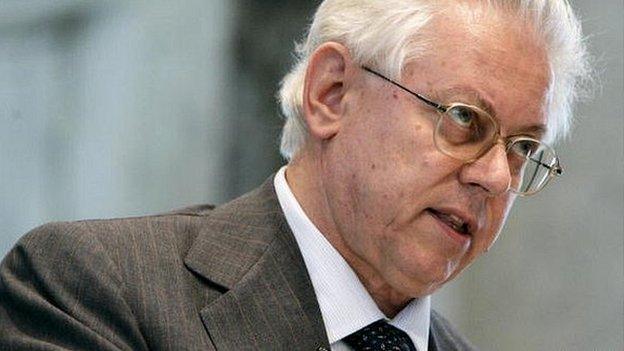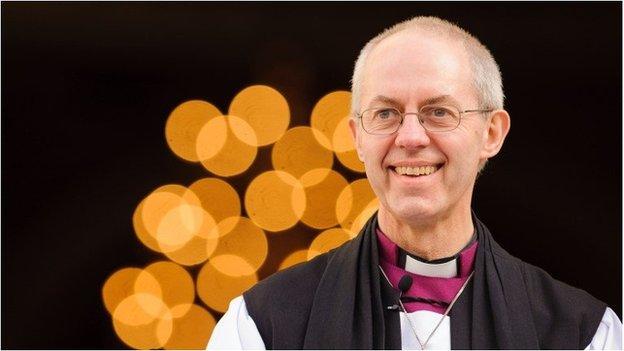Archbishop Justin Welby tells firms - pay your taxes
- Published
- comments
Justin Welby says misusing power attained through wealth is 'a sin'
The Archbishop of Canterbury has entered the febrile debate about the role of business in society, telling me that high levels of inequality must be tackled.
In an interview at Lambeth Palace, Archbishop Justin Welby said that businesses had to consider how they used their powerful positions to support society.
He will flesh out his arguments in a major speech tonight at Church House in London, entitled the Good Economy.
The Archbishop insisted he is not "anti-business", saying that on a recent visit to Coventry he saw how a revitalised car industry had created jobs and local wealth.
"Business is important, we need to affirm the significance of those who generate and create wealth," he said.
The Archbishop kept his strongest comments for the role taxes play in ensuring that companies contribute to the societies in which they operate.
"There has always been the principle that you pay the tax where you earn the money," he told me.
"If you earn the money in a country, the revenue service of that country needs to get a fair share of what you have earned."
'Sense of responsibility'
His words echo those of Mark Carney, the governor of the Bank of England, who said at the World Economic Forum at Davos last month that technology companies in particular pay taxes which are "very small relative to the returns".
Mr Carney said such companies should have a "sense of responsibility".

Chief executive Stefano Pessina's comments about Labour hit the headlines, but the Archbishop wants a broader discussion about the role of business
After speaking to the Archbishop, it appears Justin Welby agrees.
"It comes back to the very simple principle that we see in what Jesus Christ spoke of - the importance of paying what's due. The Bible speaks of it endlessly," he said.
"One of the problems is that we have this unbelievably complex tax system internationally and in each country, well in most countries.
"Somebody said the other day that the tax system is of biblical proportions, well the Bible is only 1000 pages, how many tax systems are only 1000 pages?
"They are several hundred times that.
"There needs to be simplification in tax so that people are responsible in the right place."
Moral issue
Many global companies would agree with that wholeheartedly, arguing that governments aggressively compete with each other over tax rates and then complain when businesses follow the tax rules set by policy makers.
I asked him if paying taxes was a moral issue.
"Yes of course it is - because tax is part of solidarity, tax is part of saying I belong to this place, I benefit from the fact that we have the police, a health service and a welfare system, we have external security - tax says I'm part of that and therefore I contribute to it."
Of course, the Archbishop's words come just as the whole debate about the role of business in society has sparked into life.

He said there needs to be a regulatory framework that stops abuse of power, but gives the freedom for creativity
Last weekend, Labour attacked Stefano Pessina, the acting chief executive of Walgreens Boots Alliance, for being based in Monaco.
Ed Miliband said Mr Pessina moved there to avoid paying taxes.
Mr Pessina also moved Boots Alliance headquarters to Switzerland before the merger with Walgreens last year, critics saying he did so for tax reasons.
It has since moved to the US.
Labour's attack came after Mr Pessina suggested that a Labour victory at the general election would be a "catastrophe" for businesses.
The Archbishop clearly wants a broader debate than one between two groups who are supposedly either "anti" or "pro" business.
"I'm strongly in favour of the creativity of wealth and jobs and risk taking and all that goes with that," he told me.
Abuse of power
"[But] with wealth comes power and with power comes a temptation to misuse power. There's a reality of the human condition, which Christians call sin, what the Bible calls sin - don't misuse the power you have through wealth."
Many believe that the misuse of the power of wealth is evident in the increasing inequality reported by organisations such as Oxfam.
I asked the Archbishop if some businesses were mis-using their power.
"When haven't they - in history?" he replied.
"You find this in the book of Isaiah 800 years before Christ.
"There are always elements of where that happens because people are people.
"But you don't throw the baby out with the bath water and say that business is bad, you say that there needs to be solidarity and that there needs to be a regulatory framework that does not allow the abuse of power but gives the freedom for creativity."